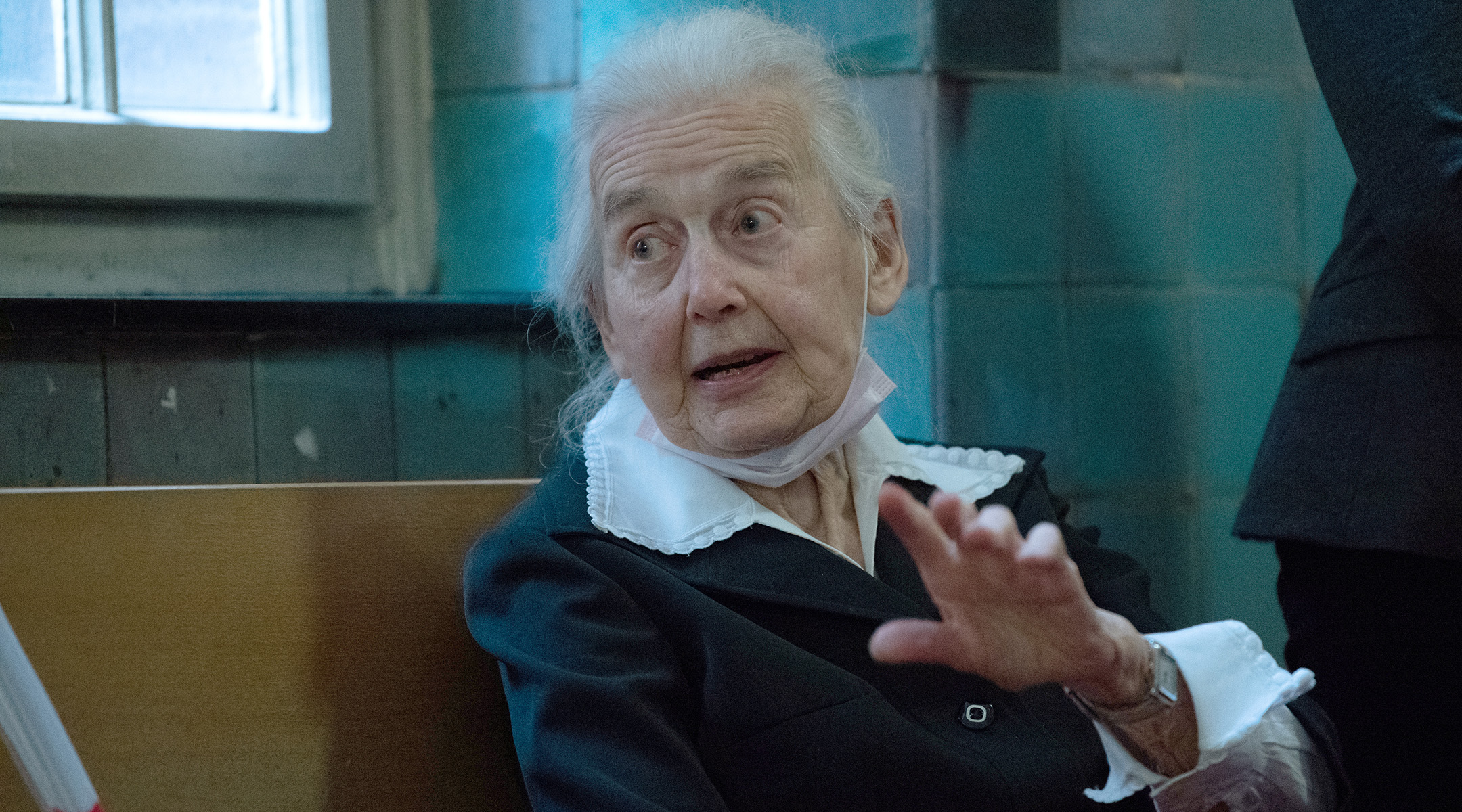Ursula Haverbeck, infamous German Holocaust denier known as ‘Nazi grandma,’ dies at 96
Ursula Haverbeck spent years in prison for publicly insisting Auschwitz was not a death camp, among other lies

Holocaust denier Ursula Haverbeck sits in a Berlin courtroom, Nov. 17, 2020. (Paul Zinken/picture alliance via Getty Images)
(JTA) — She claimed Auschwitz was just a work camp, not a death camp, and that nobody had been gassed to death there.
She challenged a German court to prove that the Nazis committed mass murder, and declared on TV that the Holocaust was “the biggest and most sustainable lie in history.”
She spent years in prison, as an elderly widow, for lying about the Holocaust, and was deemed the “Nazi grandma” by German media.
On Wednesday, Ursula Haverbeck, one of Germany’s most infamous Holocaust deniers and a hero of the country’s far-right and neo-Nazi movement, died while awaiting her latest prison term. She was 96.
Her antics, particularly in the last two decades of her life, brought shame to many Germans and helped keep Holocaust denialism from being completely snuffed out of public life there. She routinely flaunted national laws designed to keep citizens like herself from denying or downplaying the atrocity of the Jewish genocide.
“We won’t have any impact on you with words,” one German judge, Lisa Jani, announced during one such 2022 sentencing of Haverbeck. In explaining why a prison term was necessary for the nonagenarian, Jani said the defendant had “strayed miles from the historical truth” and “damaged the memories of millions of murdered people.”
“She is a lost cause,” Magistrate Bjoern Joensson, who issued an earlier sentence against Haverbeck, said about her in 2015, according to German news agency Deutsche Welle. He added that it was “deplorable that this woman, who is still so active given her age, uses her energy to spread such hair-raising nonsense.”
Born in 1928, Haverbeck married Werner Georg Haverbeck, a former Nazi officer nearly two decades her senior. Ursula largely stayed in her husband’s shadow until his death in 1999, after which she began publishing writings and other work glorifying him and the Nazis and questioning the historical record on the Holocaust.
She was first convicted and fined in 2004 for such writings; many more convictions followed. At a highly publicized 2015 trial of an Auschwitz guard, Haverbeck stood outside the courtroom and went on TV to deny that Auschwitz had ever been a death camp. She also challenged the court to prove that people had been murdered there, leading to her being sentenced to 10 months in jail.
More such sentences followed, the longest — for more than two years — coming after magazine articles Haverbeck published in 2016. After numerous unsuccessful attempts to appeal her sentence, Haverbeck initially failed to show up for her sentencing date in 2018. She was finally arrested and served the time, running for a seat in the European Parliament under the auspices of a fringe far-right party while behind bars.
Even then, Haverbeck continued to spread denialism and face heavy legal consequences. Her latest conviction for incitement came just this past June. She was sentenced to a year and four months in prison for her lies about Auschwitz and died while appealing the ruling.
As Haverbeck spread lies throughout the last years of her life, German society was shifting further to the right. Far-right ultra-nationalist parties, who have promoted messages of German pride and argued that Germans should no longer have to feel guilty about the Holocaust, have gained more seats in parliament; celebrity politicians have made waves for inciting comments, including employing banned Nazi phrases.












